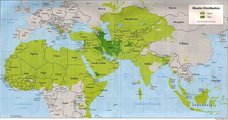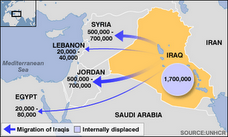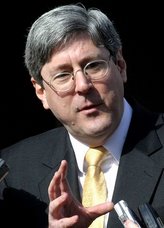By Nidhal al-Laithi, Azzaman, April 7, 2007
Shiite cleric Moqtada Sadr, whose militias are fighting U.S. and Iraqi troops in southern Iraq, is reported to have dismissed his group’s representatives in the parliament. The group has 35 members in parliament, about one third of the ruling Shiite coalition. The dismissal, if confirmed, will be a blow to the government of Prime Minister Nouri al-Maliki.
Maliki’s government is already under immense pressure. Other smaller blocs in parliament are trying to work a new coalition with the explicit aim of toppling Maliki. If Sadr withdraws his support, Maliki’s government will be in a precarious situation politically.
The move by Sadr came following the joint attack by U.S. and Iraqi troops on one of his major strongholds in the southern city of Diwaniya. (fighting in Diwaniya) It is not clear why the U.S. started its move against Sadr and his powerful Mahdi Army in the city of Diwaniya, 180 kilometers south of Baghdad.
Iraqi watchers say the city is a major base of Sadr and that many of his commanders had taken it as a refuge to avoid direct contact with U.S. troops striving to appease Baghdad streets. But Sadr’s influence is still felt on the streets of Baghdad particularly in the townships of Shuala and Sadr City where nearly three million of Baghdad’s 6 million people live.
Even in Diwaniya, members of Mahdi Army have reportedly opted not to fight the Americans as they did in their two major previous uprisings one in Baghdad and the other in the holy city of Najaf. Many of Sadr’s armed men are said to have quietly left the city even before the start of the operation.
Sadr’s group is a major rival to the Badr forces, the militia group run by the Supreme Council of the Islamic Revolution in Iraq or SCIRI. SCIRI is currently an ally of U.S. troops and Maliki’s government. Sadr aides say the attack on their bastion in Diwaniya was aimed to curtail their influence and presence in southern Iraq.
Tuesday, April 10, 2007
Subscribe to:
Post Comments (Atom)





No comments:
Post a Comment